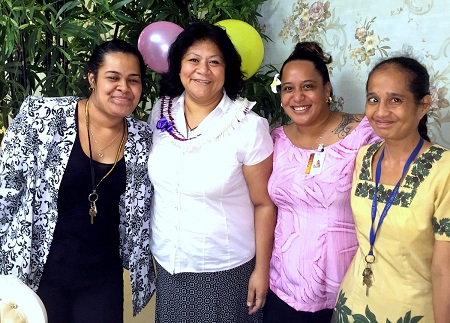
University Center for Excellence in Developmental Disabilities (UCEDD) Director Ms. Tafaimamao Tua-Tupuola (second left), seen here with her UCEDD staff, has been selected to serve on the Disability Advisory Council, which will advise the Federal Communications Commission on a variety of issues pertaining to the disabilities community. (Courtesy Photo)

University Center for Excellence in Developmental Disabilities (UCEDD) Director Ms. Tafaimamao Tua-Tupuola (second left), seen here with her UCEDD staff, has been selected to serve on the Disability Advisory Council, which will advise the Federal Communications Commission on a variety of issues pertaining to the disabilities community. (Courtesy Photo)
ASCC-UCEDD Director Chosen for FCC Committee
Febraury 19, 2015
By James Kneubuhl, ASCC Press Officer
Ms. Tafaimamao Tua-Tupuola, Director of the University Center for Excellence in Developmental Disabilities (UCEDD) at the American Samoa Community College (ASCC), has been selected to serve on the Disability Advisory Committee (DAC), a group made up of individuals recognized for their exemplary advocacy on behalf of the disability community, who will advise the Federal Communications Commission (FCC) on a wide array of disability matters within the jurisdiction of the Commission and facilitate the participation of people with disabilities in proceedings before the Commission.
Upon the establishment of the DAC, the FCC received over 120 nominations for the Committee members, and chose a diverse and balanced mix of advocates representing individuals with disabilities, the communications and video programming industries, the public safety industry, trade associations, academics, researchers, and other stakeholders. Ms. Tua-Tupuola was the only nominee chosen from within the US Territories, and as a DAC member she is committed to a two-year term of service and to attending at least three one-day plenary committee meetings for each year of the Committee's term.
Ms. Tua-Tupuola graduated from Samoana High School and majored in Business Management at ASCC. Continuing her studies off-island, she earned her BA in Developmental Disabilities and Deaf Education and a MA in Special Education. She is currently pursuing a PhD in Law and Public Policy from Walden University. Tua-Tupuola has also earned Professional Certificates in the Counseling of Deaf and Hard-of-Hearing adults from Western Oregon University and for her participation in the Homeland Security Pacific Executive Leaders Program from the Naval Postgraduate School-Center for Homeland Defense and Security.
“I’ve always wanted to work in the field of disabilities since I was in elementary school,” said Tua-Tupuola. Returning from college, her first job in American Samoa was with the Special Education Deaf Program for three years before joining the UCEDD at ASCC in 1994 and becoming its Director in 1999. “Many see people with disabilities as a challenge or with limitation,” she reflected. “I perceive them as an inspiration to keep my values in check. The barriers faced by the disability community to live a meaningful life accelerate my attention to the core of the problem from a systemic perspective.” The UCEDD addresses all aspects of life for individuals with a disability, including education, housing, recreation, employment, transportation, emergency preparedness, child-care, health, and aging.
Among the issues commonly associated with disabilities, communications is not one that typically comes to mind, but Tua-Tupuola clarified how, especially in today’s world, accessible communication is an essential need for the disability community. “It’s important to consider communication barriers for people with disabilities,” she said. “Service providers promote people with disabilities to live independently and inclusively. However, if they live independently, how can they access 911 during an emergency? How can they access the weather or evacuation report on TV or radio? The 1990 Americans with Disabilities Act (ADA) Title IV covers access to telecommunication. However, the disability community still experience barriers in this area across the U.S and its Territories. This is why we need a wide spectrum of representation from people with disabilities, professionals in the field, and communication service providers as DAC members.”
Even prior to the first-ever DAC meeting next month, Committee leaders are facilitating the establishment of sub-committees to focus on several concerns deemed crucially important. These include telecommunications relay services; video programming access (including closed captioning, video description, access to video programming apparatus, and access to televised emergency information); access to 9-1-1 emergency services; and access to communications services and equipment (including advanced communications, telecommunications, hearing aid compatibility, and the National Deaf-Blind Equipment Distribution Program).
Ms. Tafaimamao Tua-Tupuola expressed enthusiasm for the possible benefits her participation in the DAC might bring to American Samoa and the rest of the US Territories. “I hope to contribute valuable input not only from American Samoa, but also our sister territories,” she said. “I’ve already begun a dialogue with the territories on disability access barriers to determine if we share the same concerns.”
